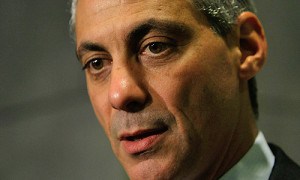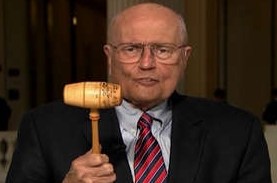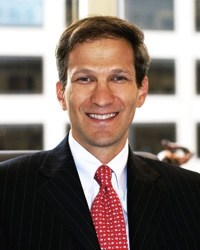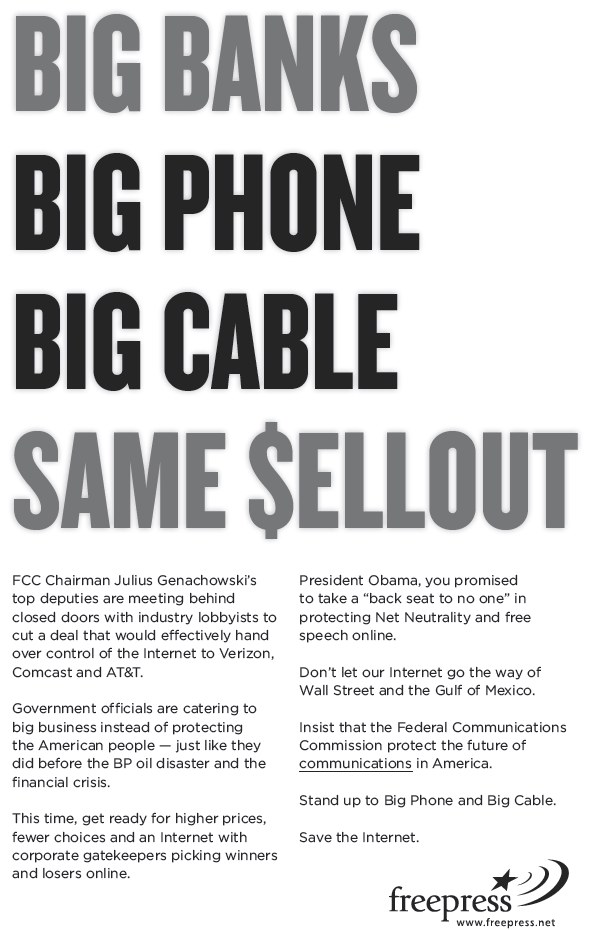
Is Rahm Emanuel the consigliere to a deal to sell out broadband consumers to big telecom companies like AT&T, Verizon, and Comcast?
White House Chief of Staff Rahm Emanuel is said to so afraid of big phone and cable companies donating millions to Republican candidates, he told agencies like the Federal Communications Commission to go along with Verizon, AT&T, and Big Cable’s demands for an end to Net Neutrality and other pro-consumer broadband reforms.
That is the rumor industry expert Dave Burstein is hearing about the prospects of broadband reclassification actually happening at the FCC this year.
It seems Verizon’s CEO Ivan Seidenberg has become a frequent guest at the White House, appearing 16 times since President Obama took office. Seidenberg is behind the notion that saddling giant telecommunications companies with Net Neutrality will force those firms to flood Republicans with unprecedented campaign contributions. That’s fascinating news, especially since most politicians claim campaign contributions never make any difference in how they vote on issues. Perhaps Verizon is just being extra charitable this year. The Republicans, who fall lock-step in support behind the nation’s largest phone and cable companies, will be delighted to accept.
With politicians like Rahm Emanuel involved, the fix may already be in. Rule number one in politics is to always follow the money. Rule number two is that many politicians will always take the money and vote against their constituents’ best interests unless voters are paying attention. When a politician is forced to weigh the consequences of accepting a fat check from a corporation and voting with them or infuriating their constituents to the point of potentially losing the next election, they’ll vote with their constituents.
Meanwhile, telecom companies are engaged in a divide-and-conquer strategy, with Verizon recently making gestures to Google, one of Net Neutrality’s strongest proponents. Burstein thinks that unless public interest groups and the public-at-large don’t force an end to these insider deals, Net Neutrality and other broadband reforms will become little more than a voluntary agreement not to be too evil (until they redefine ‘evil’ as ‘good’ and do it anyway):
Julius (Genachowski) has already agreed to almost everything [telecom lobbyists] really want, including loopholes wide enough to carry 350 TV channels. [Stifel Nicolaus] says there is still some opposition so that nothing is final and that the public interest groups are ready to assail Julius. Meanwhile, Verizon and Google are discussing a separate peace that will make the FCC irrelevant.
This one is about power and money, not principle. The likely outcome is an agreement that will allow everyone to say noble things, will allow Julius to look himself in the mirror, and will essentially have no substance. I hope I’m wrong.
[flv width=”640″ height=”500″]http://www.phillipdampier.com/video/Bloomberg Bloomberg’s Shields Discusses Net-Neutrality Battle 8-3-10.flv[/flv]
Bloomberg News reviews the regulatory landscape with the FCC’s secret weekend meetings to find a deal on broadband rules. (2 minutes)
For consumer groups like Free Press and Public Knowledge, already furious over secret backroom negotiations between FCC officials and the nation’s large phone and cable companies, any deal that culminates in providers being allowed to tamper with Internet traffic, choosing favorites along the way, is tantamount to a deal with Tony Soprano.
Tim Karr from Free Press wrote a guest editorial in the Seattle Times Sunday warning there is a corporate deal in the making to take over the Internet:
On the one side, elected officials and regulators have heard from millions of citizens demanding that Washington protect this rule that preserves the Internet’s open architecture.
On the other is a lobbying juggernaut that seeks to dismantle online openness so that phone and cable companies can rebuild the Internet as a gated community that serves their bottom line.
The problem is that policymakers aren’t holding the line for the public. They seem content simply to cut a deal between companies with the most political and economic clout.
If that doesn’t worry you, it should.
Because the deal they’re cutting is over who ultimately wins control of online information. And it goes without saying that you’re not in the running.
Google, Verizon, AT&T and others are reportedly nearing consensus on an agreement that could radically redesign the Web, allowing the carriers to build priority access lanes that admit only large companies that can pay the toll.
Where will that leave the rest of us? Stranded on the digital equivalent of a winding dirt road, with slower service, fewer choices and limited access.
Here’s the kicker. The Federal Communications Commission, the one agency tasked with protecting your interests online, may be poised to sign off on this plan. The agency is reportedly convening closed-door meetings with these companies to strike a deal that would let Internet providers implement a “paid prioritization” scheme.
According to The Washington Post, the FCC’s chief of staff wanted to “seize an opportunity to agree on ways that carriers could “manage traffic” on their networks.
If recent articles by Amazon and AT&T execs are any indication, paid prioritization would allow carriers to ransom access to their customers to the highest bidder. AT&T’s top lobbyist, James Cicconi, wrote that such extortion was “not only necessary but in the best interest of consumers.”
Don’t believe it. The beauty of the open Internet is that anyone with an idea has a chance to take on giant corporations without first having to bribe network owners for access. Net neutrality is the rule that guarantees this openness.
It’s because of Net neutrality that great ideas like YouTube (which began in an office above a pizzeria in San Mateo) and Twitter (which grew out of a daylong brainstorming session among podcasters) blossomed to revolutionize how we connect and communicate with one another.
The paid prioritization deal under consideration wouldn’t allow for the next YouTube. And the next Twitter would likely never make it off the drawing board.
This scheme would let companies like Comcast and AT&T favor their own video services, voice applications and social media. It would let Verizon build a wide moat around its Internet fiefdom, insulating itself from competition by upstart innovators that want to show consumers how things can be done better and more cheaply.
Columbia Law Professor (and Free Press board chairman) Tim Wu has said that letting carriers choose favorites is “just too close to the Tony Soprano vision of networking: Use your position to make threats and extract payments. This is similar to the outlawed, but still common, ‘payola’ schemes in the radio world.
“If allowing network discrimination means being stuck with AT&T’s long-term vision of the Internet,” Wu concludes, “it won’t be worth it.”
Should any of this come to pass, it will mark the end of any credibility for FCC Chairman Julius Genachowski, who will have sold out to the interests of big telecom and, more importantly, proved himself little more than another inside-the-beltway-liar. The implications for the Obama Administration’s credibility on broadband issues are devastating.
It was Genachowski himself who promised this would be the most open FCC ever and that he would see to it that the open principles of the Internet were safeguarded. It’s more than a little difficult to see that happening while Genachowski’s staff secretly meets with telecom lobbyists to conclude a deal that will turn over control of Internet traffic to a broadband duopoly.


 Subscribe
Subscribe





